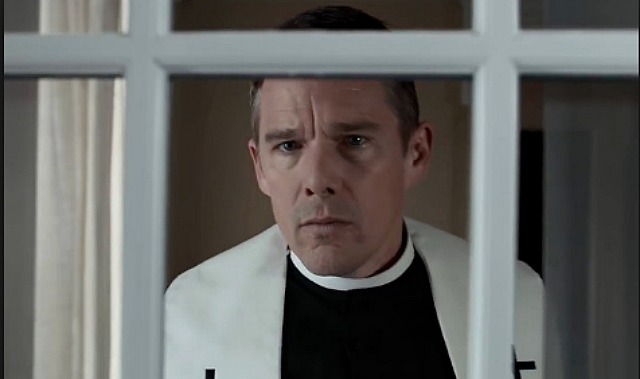From “First Reformed Asks, Can God Forgive Us? Its Director Has an Answer,” a 6.20 N.Y. Times q & a between First Reformed director Paul Schrader and critic A.O. Scott.
Does Scott still disapprove of Woody Allen despite Moses Farrow’s essay? This has nothing to do with the Schrader q & a, but it irks me all the same.
Scott: “You take the audience into this condition of extremism, but you’re there as if it were a perfectly natural place to be.”
Schrader: “I’ll tell you the trick, and I figured it out years ago. It’s a three-stage trick. First stage is nonemotive narration. So it’s like intravenous feeding. You’re getting nutrition but you can’t taste it.

Than Hawke in First Reformed.
“The next stage is the world is only as our protagonist perceives it. You see no other reality. There’s never a scene that he’s not in. So now you’re seeing his life, you’re being filled up with his thoughts and after about 45 minutes or so, you’ve identified. How could you not identify?
“Then, often slowly, you have to go off the rails a little bit, a little bit, a little bit. The first few times it doesn’t bother you, but then all of a sudden [you’re] saying ‘whoa, I’m identified with somebody that I don’t think is worthy of identification.’ What do I do about that?
“And that’s a great place for an artist to take a viewer because you can’t predict how people will respond when they’re opened up that way, [and so] they’re going to have to do something to defend themselves. Here’s how you can defend yourself: Just take a jump, you know.”
Scott: “On one hand you’re appalled by what he’s contemplating and you realize that you are in some way rooting for…
Schrader: “A jihadist.”
Scott: “On the other hand, you can’t say in terms of his analysis of the relevant information that he’s wrong.”
Schrader: “This is the path that he’s meant to take. One thing I cut out of the film: When he has the [suicide bomber] vest on, he had written three entries in [his diary] and I filmed them and then decided no, it’s better to let the audience imagine what his last words are.
“First he writes, ‘magical mystery tour’ and then he crosses that out. Then he writes, ‘Will God forgive us?’ and he crosses that out. Then he writes, ‘I wish I could’ve chosen a more convenient way to die.’ And then he closes the book. And that’s exactly Gethsemane. Take this cup away from me. Lord, take this cup of Drano away from me.”
